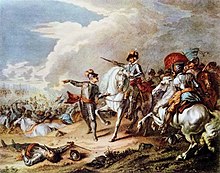
Back Engelse Burgeroorlog Afrikaans Guerra Civil Anglesa AN Englisca Ingewinn ANG अंग्रेज़ी गृहयुद्ध ANP الحرب الأهلية الإنجليزية Arabic Revolución inglesa AST İngiltərə burjua inqilabı Azerbaijani اینگیلیس ایچ ساواشی AZB Англияла революция Bashkir Англійская рэвалюцыя Byelorussian
| English Civil War | |||||||
|---|---|---|---|---|---|---|---|
 The Battle of Naseby, which was won by the Parliamentarians and ended the longest part of the war | |||||||
| |||||||
| Belligerents | |||||||
| Royalists | Parliamentarians | ||||||
| Commanders and leaders | |||||||
| King Charles II | Oliver Cromwell | ||||||
| Casualties and losses | |||||||
| 50,000[1] | 34,000[1] | ||||||
The English Civil War happened in the middle 17th century. The term civil war is a war where the sides involved in the fighting are from the same country.
At the centre, there was a struggle between King Charles I and the Parliament of England over how England should be ruled. The King wanted to rule without Parliament telling him what to do. At first Parliament wanted to reduce the King's power, but later it decided that the country did not need a king. King Charles's supporters were known as the Royalists, and were nicknamed "Cavaliers". Parliament's supporters were known as the Parliamentarians, and were nicknamed "Roundheads".
From 1639 to 1653, there was fighting in England[a], Scotland and Ireland, three separate countries that were ruled by the same king. The fighting that took place in each of these countries broke out at different times and for different reasons. In England, it lasted from 1642 to 1651. Some people think of this as one big war, while others think of it as three separate wars: the First English Civil War (1642-46), the Second English Civil War (1648) and the Third English Civil War (1649-51). The wars are also sometimes known as the Wars of the Three Kingdoms, including the Bishops' Wars in Scotland in 1639 to 1640 and the Irish Rebellion from 1641 to 1653.
The Parliamentarians won the war. Charles I was captured, put on trial and in 1649 he was executed. His son Charles II then tried to take over the country, but lost and escaped abroad. As a result, the three kingdoms spent 11 years without a king. For most of this time, they were run by Oliver Cromwell, a former Parliamentarian general. After Cromwell's death, the monarchy was restored under Charles II. However, kings were never as powerful as they had been before the war.
- ↑ 1.0 1.1 "ENGLISH CIVIL WARS". History.com. Retrieved 4 October 2014.
<ref group=lower-alpha> tags or {{efn}} templates on this page, but the references will not show without a {{reflist|group=lower-alpha}} template or {{notelist}} template (see the help page).
© MMXXIII Rich X Search. We shall prevail. All rights reserved. Rich X Search